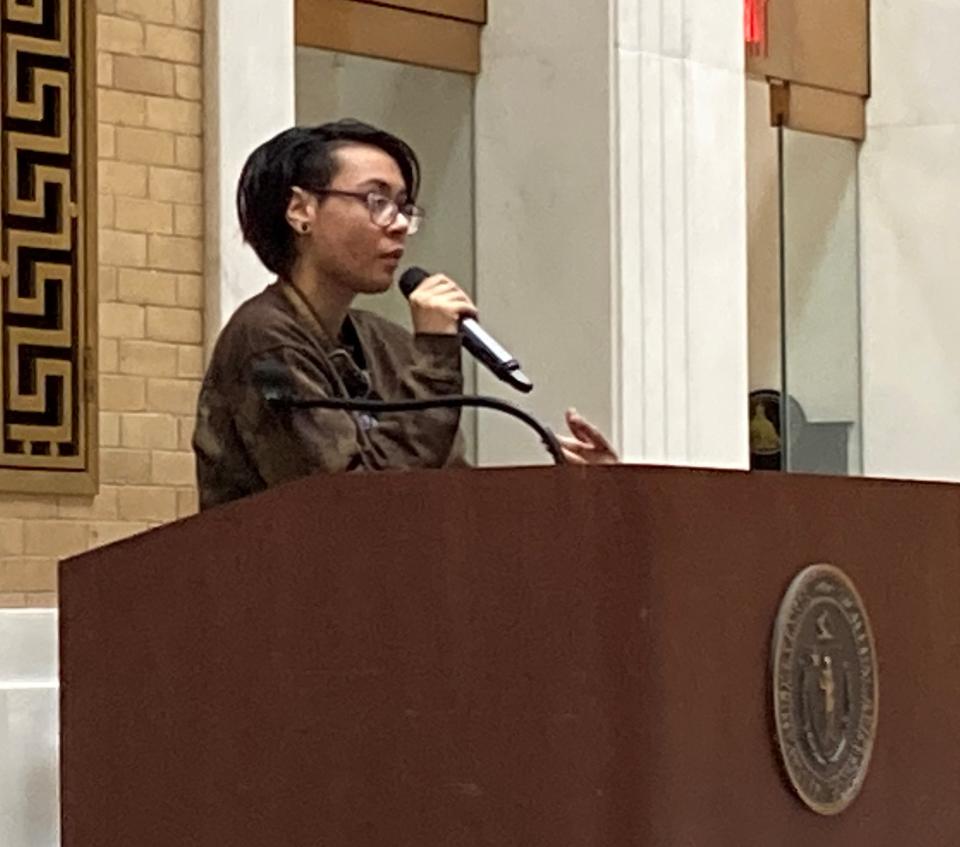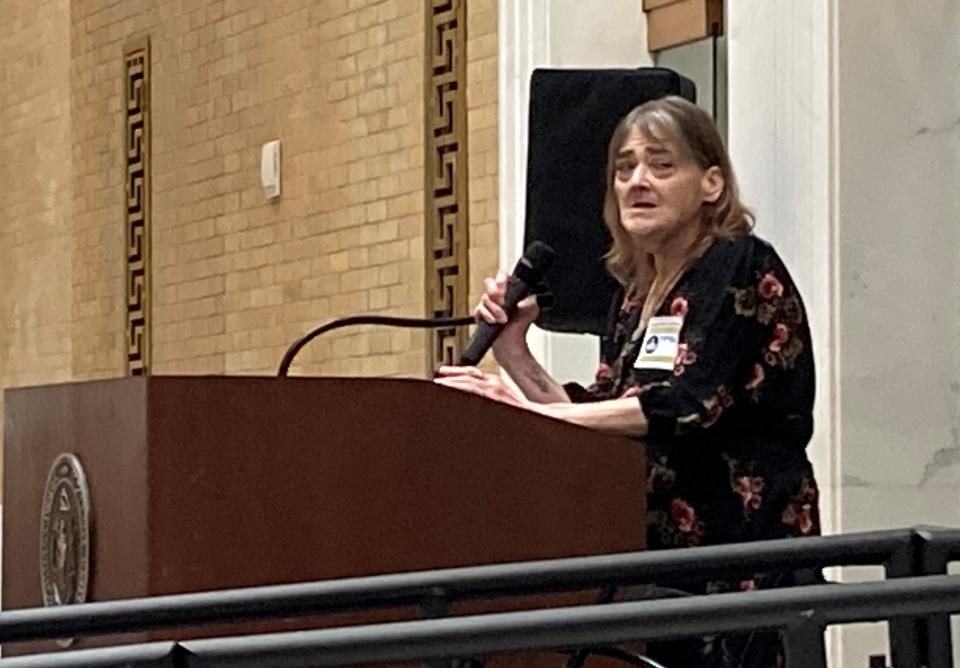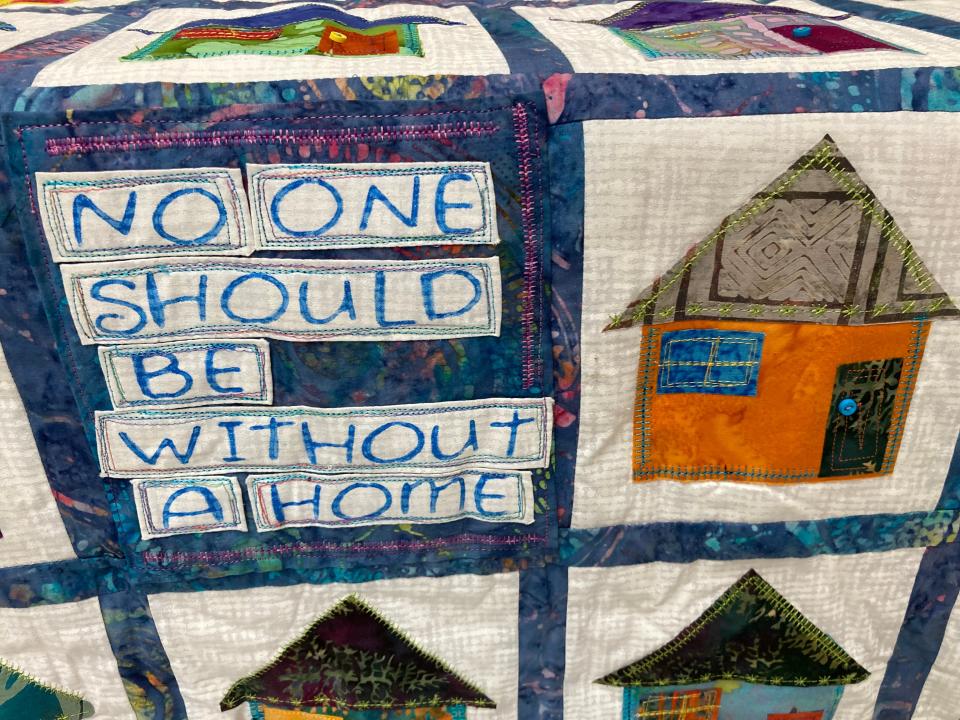Homelessness: a hidden problem in Mass. affecting teenagers, students, workers, families
BOSTON - The reality in Massachusetts, revealed at a legislative action day Thursday hosted by the Massachusetts Coalition for the Homeless, is that Bay Staters are couch surfing, living in their cars, sleeping hard and in need of more state supports.

“Anyone can become homeless,” said Jack Diaz, a senior at Northeastern University, a formerly unhoused student who relied on the university’s dormitory system, on the kindness of friends, relatives and strangers for housing, either through a whole semester of classes or overnight.
Currently housed, Diaz works at Breaktime, a Boston-based advocacy organization dedicated to breaking the cycle of youth and young adult homelessness. Diaz said they had been chronically homeless since 19.
“I was part of the invisible homeless,” Diaz said.
Lawmakers attending the legislative action day organized by the Massachusetts Coalition for the Homeless Thursday, hosted by representatives Kay Khan, D-Newton, and James O’Day, D-West Boylston, heard Diaz’s story, and several others. They learned the slide into homelessness can be triggered by common circumstances — missed rent or mortgage payments due to unemployment, sky-high medical bills, death of spouses, divorce or other emergencies.
The lived experience that stories served to highlight proposed legislation that streamlines certain programs and codifies or makes them permanent. These include programs that benefit unhoused residents of Massachusetts such as Residential Assistance for Families in Transition; HomeBASE, a family rehousing program; and a measure that would allow for local-option rent stabilization and rent control.
Other sponsored measures include identification cards for unhoused people and for those exiting carcel facilities and a bill of rights for people experiencing homelessness.
Without an ID, people cannot normalize their lives
Donnie Lee, a Boston resident, learned the hard way that without having identification he could not get his life on track after serving time and being released from a federal penitentiary. Upon release, he was given money, anything he had earned or had been sent to him by family, and a prison ID.
“But that wasn’t valid anywhere else,” Lee said. He needed a real ID to establish himself in society, find a place to live, apply for services, get a job and a bank account, cash a check. But without an ID, he couldn’t get housed; without an address, he couldn’t get a copy of his birth certificate to apply for an ID.
“There are enough bumps in the road for people released from jail. Getting an ID should not be one of them,” Lee said. “Without an ID, you’re a ghost.”
Khan, who has a bill waiving fees for identification cards for certain populations in Massachusetts, pointed out that “there are so many things people cannot access without having an ID.” She noted that while the cost of a state-issued Massachusetts ID is $25 and seemingly affordable, that fee can be an insurmountable barrier for a person who is homeless.
Her bill, “Everyone Needs an ID,” would waive fees for IDs for homeless adults and teenagers, allowing residency verification through alternate means rather than a permanent address.
Sen. Lydia Edwards, D-Boston, reminded her colleagues that the “fault” of homelessness does not lie with the people who become unhoused but rather within the system — the lack of a secure safety net for people living through emergency situations in the richest country in the world.
Homelessness systemic problem, not character flaw
“It is not a character flaw,” Edwards said, adding that for every dollar spent to avert homelessness, there is a $10 savings for future service needs. “Even if you have no moral compass, it’s a question of simple mathematics.”

On Wednesday, legislators in the House passed a supplemental budget bill adding $245 million to the state's emergency shelter system that also limited the length of time families were allowed to stay in the shelter to nine months, with some exceptions. The system has been taxed by the influx of migrants into Massachusetts. About half the 7,500 families currently in the system are Massachusetts residents, with the remainder new arrivals. The bill is now in the hands of the Senate.
Marybeth Bacigalupo-Worden, who now lives in Worcester, has transitioned in and out of homelessness her whole life, surrendering a child to her sister and mother as a young adult because of her living situation. Having regained shelter, she now volunteers as an advocate for homeless people and spends Thursdays feeding all comers with the Worcester Fellowship.
While she appreciates the services provided by Massachusetts, some provisions can be frustrating, such as the monthly housing stipend that fails to cover even a single-occupancy room in a boardinghouse, and decreases in the stipend if a person is in a shelter.
It is challenging, she said, to find a way out of the cycle of homelessness.
Diaz offered her life as a prime example of the circumstances that keeps people trapped.
Diaz said their chronic homelessness was somewhat mitigated when they were accepted into college. “I jumped at the chance to live in the dorms.”
The invisible homeless
However, dorms close during school breaks and Diaz was once again left wondering where the next meal or place to sleep was coming from.
“It’s frustrating, as an educated young person, to have barriers to housing,” Diaz said. Working full time and attending university full time, Diaz saved and budgeted yet still could not get ahead. The most they ever managed to save $2,000, funds that were repeatedly wiped out by one emergency after another.
Even if Boston-area rents were affordable by working people, the need to have first and last month’s rent in order to sign a lease, to have an acceptable credit score, a work history, “at 18, who has that?” Diaz asked.

“I took pride in my work ethic, my intelligence, my will power, my ambition, but I was still not able to afford rent by myself or with roommates,” Diaz said. Advice to spend wiser, eschew coffee out, stop purchasing video games frustrated Diaz even more: “Make coffee at home? What home? Video games?” Diaz laughed at the suggestions. “I have no money to spend.”
Salvation came through a shelter placement. Two years in the shelter allowed Diaz to save money and find housing through state services. A case manager now advocates for Diaz in questions of rent.
“Being homeless is traumatic,” Diaz said, explaining that there is little a person can do when unhoused except worry about their next meal, shower and shelter. “My grades reflect my living situation. Housing is a human right. Anyone can become homeless.”
This article originally appeared on Telegram & Gazette: Advocates flood State House to support bills mitigating homelessness

